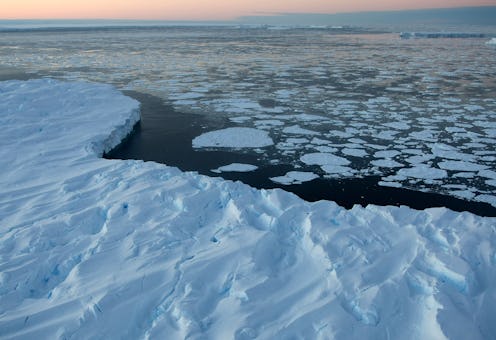News
The U.N.'s Grim Warning on Climate Change
Be warned, because sad to say, this isn't very uplifting news. Climate change is real, present, and dangerous — but you probably already knew that, after years of research, warnings from researchers and scientists. It's really a matter of settled science, with researchers having already confirmed earlier this year that the West Antarctic Ice Sheet is melting, and beyond the point of reversibility. And there's never a shortage of new warnings on the horizon, as Sunday showed: a UN climate change report says "irreversible" warming is happening, and the only way to mitigate it is to start cutting back on our emissions in a big way.
In other words, it delivers that same, grave message that we've all likely heard many times before — clean up our act, or our climate turns against us — but without even the hope of escaping the effects of a warming planet, just easing them. The report, authored by the UN's Intergovernmental Panel on Climate Change, stressed that if emissions go unchecked, the global average temperature could rise by over 8 degrees Fahrenheit by 2100.
The only way to prevent those levels of warming, the report found, would be to slash greenhouse gas emissions by 70 percent by 2050, and 100 percent by 2100 — a tall order, so long as climate change denial remains a distressingly in-fashion fallacy in the United States, to say nothing of resistance from major foreign polluters like China.
This is just another recent reminder of, speaking frankly, how screwed we all are thanks to decades of political inaction on climate change, and the subculture of denial that's uniquely prevalent in the United States. This isn't to say that adjusting human behavior to protect the climate was ever going to be easy — any issue that demands good-faith cooperation between multiple world powers is going to be a headache, after all — but suffice it to say, humanity hasn't exactly wrapped itself in glory on this front.
That's because, for all the obstacles, the stakes are about as high as they get. For example, take this study on the potential effects of climate change on human health, published in the Journal of the American Medical Association in late September. It lays out a number of potential risks to human health associated with a warming climate, including increased incidents of heat stroke, heart failure, and respiratory ailments (chronic obstructive pulmonary disease in particular, one of the world's biggest killers).
The report drew a statement from U.S. Secretary of State John Kerry, underlining the seriousness and time-sensitivity of the dilemma, and invoking a familiar angle on the whole issue — what are we leaving behind for future generations?
The bottom line is that our planet is warming due to human actions, the damage is already visible, and the challenge requires ambitious, decisive and immediate action. We can't prevent a large scale disaster if we don't heed this kind of hard science. The longer we are stuck in a debate over ideology and politics, the more the costs of inaction grow and grow. Those who choose to ignore or dispute the science so clearly laid out in this report do so at great risk for all of us and for our kids and grandkids.
Hear, hear. Of course, climate chance is (regrettably) a highly political issue in America, with the Republican Party often opting to insist they "aren't scientists" when asked about climate change. So basically, if this matters to you, it's worth remembering to turn out for the upcoming midterm elections on Nov 4.
Images: Getty Images (2)
